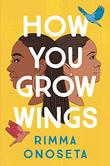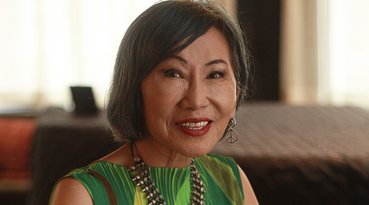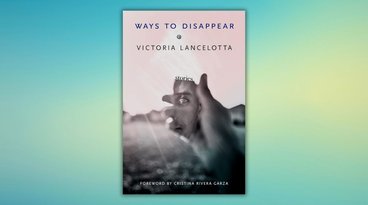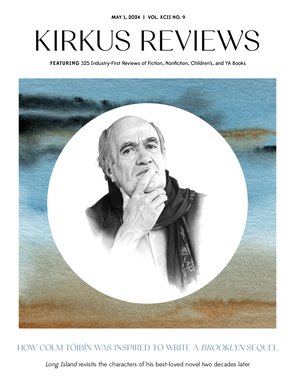Readers in the U.S. have recently been treated to a wave of groundbreaking novels from Nigerian women writers—among them Stay With Me, by Ayobami Adebayo, The Girl With the Louding Voice, by Abi Daré, and Dele Weds Destiny, by Tomi Obaro. The latest of these is How You Grow Wings (Algonquin, Aug. 9), a debut by 27-year-old Rimma Onoseta published for young adults.
“When I read the synopsis of Stay With Me, about a wife being forced out of her family because she can’t get pregnant, I’m like, This reads like every Nollywood movie ever made. Then I picked it up, and it was one of the best things I’ve read!” says Onoseta in a recent interview conducted by Zoom and email. Flipping the perspective to the woman at the story’s center and highlighting the limited set of choices available to her made all the difference.
How You Grow Wings carries this approach into the young adult category—Onoseta takes classic Nigerian storylines about family and class, marriage and child-rearing, the village versus the city, and regrounds them in the current realities of life for Nigerian teenage girls, struggling to bridge the gap between tradition and modernity.
As a starred Kirkus review puts it, this is “a universal story: girls striving to find their way in a patriarchal society…a stunning and emotional debut.”
 Onoseta was born in Benin City and raised in Lagos, but at the time she read Stay With Me, she was living and working in Tempe, Arizona, putting her undergraduate degree in finance and her MBA to use at a marketing job. The year before, while still in grad school, she had penned a first-person story in the voice of Zam, a young teen in Alihame. Though Zam’s background is nothing like Onoseta’s privileged upbringing, the author shares with her character the yearning for a sister. The difference is—Zam actually has one. Her name is Cheta, and they can’t stand each other.
Onoseta was born in Benin City and raised in Lagos, but at the time she read Stay With Me, she was living and working in Tempe, Arizona, putting her undergraduate degree in finance and her MBA to use at a marketing job. The year before, while still in grad school, she had penned a first-person story in the voice of Zam, a young teen in Alihame. Though Zam’s background is nothing like Onoseta’s privileged upbringing, the author shares with her character the yearning for a sister. The difference is—Zam actually has one. Her name is Cheta, and they can’t stand each other.
“I grew up with three brothers, and, as a young girl, I was convinced that a sister would be a lifelong best friend and confidante,” she explains. “But what if having a sister isn’t what I always imagined it to be?”
The pages sat untouched for a year as Onoseta graduated and moved to Arizona for her job. “It paid the bills,” she says, “but I didn’t feel like I was doing what I was meant to be doing. And around this time—early 2017—I read Stay With Me. Between that book and the successes of Yaa Gyasi and Tomi Adeyemi, it was a catalyst. Young African women were writing their stories. If they’re doing it, I told myself, I can, too!”
To get her story down, Onoseta turned the fact that she didn’t own a car to her advantage. “After work, I would take the bus to the Tempe Public Library, and because the bus only came once an hour, I forced myself to sit there and write for an hour. By the end of the year, I had a draft of a book.”
In the first draft, she recalls, Cheta was the villain of the story. A proud girl constantly at war with her physically and emotionally abusive mother, she has no affection or understanding for the little sister she sees as their mother’s toady. But having grown up in the shadow of the tension and violence between Mama and Cheta, Zam is just doing everything she can to stay out of the crossfire.
In an opening scene of the book, a first cousin is being brutally beaten by an uncle for her involvement with a married older man; the rest of the family cheers him on, or at least stands by and does not interfere.
“A lot of us grew up thinking that this type of treatment was normal, but the push back has begun,” says Onoseta. Feeling that millennial and Gen Z Nigerians have the insight to see this intergenerational trauma for what it is, she has made that theme central to How You Grow Wings.
Mama is not the only damaged maternal figure in the novel. Aunt Sophie is married to Zam’s paternal uncle, a wealthy man upon whom the extended family relies for handouts. Though Aunt Sophie is an important mentor for Zam, she is cold and distant with her own daughter, Kaira. “Zam is able to come to understand the reasons for Aunt Sophie’s behavior, but for her own mother, empathy is much harder to find,” Onoseta explains.
Among other factors, Mama has been emotionally damaged by colorism—“which rages in Nigeria despite the fact that we’re all West Africans here,” Onoseta points out. Nicknamed Blackie in her youth, Mama is now devoted to the daily use of bleaching creams, burning her skin, leaving her splotchy.
Cheta, her darker daughter, seems to feel none of this inferiority, and even her confidence is part of what Mama resents about her. In the second draft of the book, Onoseta changed Cheta to a first-person narrator, giving her equal time in chapters alternating with Zam’s. In the process, “I discovered she was not the villain at all,” says Onoseta. “In fact, I found a bit of myself in her, in her willingness to call things out and name them for what they are.”
The book tracks both girls as they escape from the toxic environment of their childhood—Zam on a red carpet unrolled by Aunt Sophie; Cheta taking a much rougher route, involving choices rarely seen in YA literature and ending in a way that challenges readers to examine their own attitudes.
“The ending changed many times before I found the one that was right. I was going back and forth with my agents and my editor. I didn’t want it to be a case where the reader becomes judge, jury, and executioner—I didn’t want to support that by punishing Cheta with a bad outcome. As I wrote this ending, I cried—that’s how I knew it was right. This is the ending that the girls deserve.
“How You Grow Wings is a story about trying to be seen,” she says, “about what happens when your village fails you, and about difficult life choices. If you make a bad decision, does that mean you are a bad person?”
Though she didn’t write the book with the YA market in mind, Onoseta feels passionately about the importance for young people of “reading outside their culture.” How You Grow Wings is filled with Ika words and expressions and culturally specific details that could inspire further research and discussion. “I’d love to have the chance to meet with teen readers,” she says. “So far I’ve mostly heard from adults about the book.”
She’ll be back in the States and available for such opportunities this fall, moving to Boston to start an MFA program in screenwriting. Does she imagine How You Grow Wings on the big screen? “Of course,” she says, “there’s nothing I’d love more.”
Watch out, Nollywood!
Marion Winik’s most recent book is The Big Book of the Dead.









































